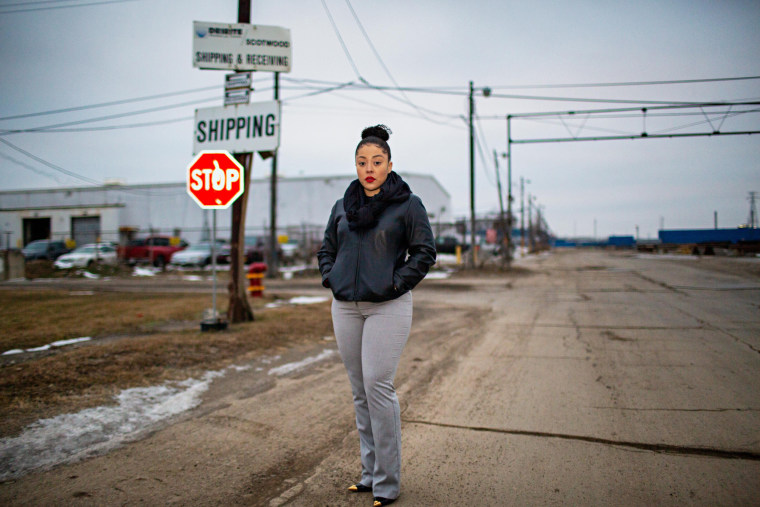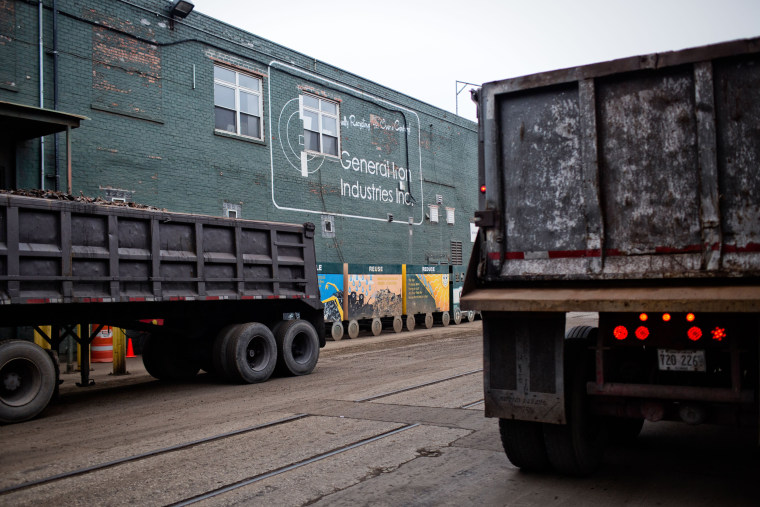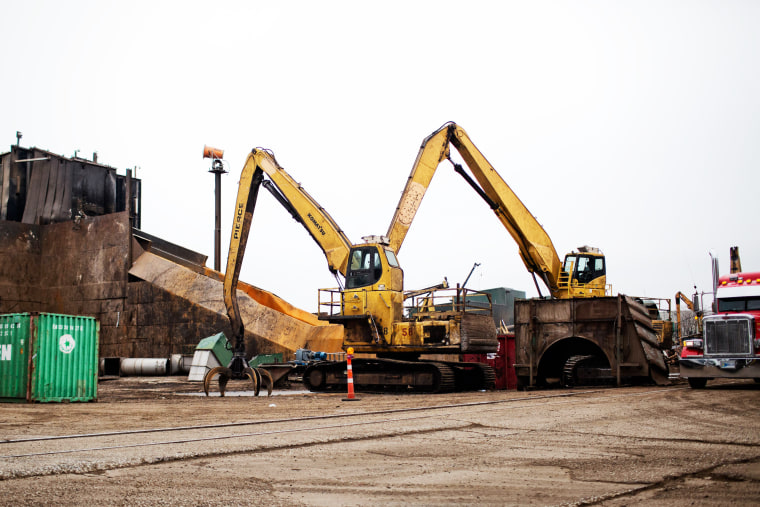CHICAGO — The city violated the civil rights of its residents by playing a “driving role” in the proposed relocation of a scrap metal facility with a history of pollution complaints from a mostly white neighborhood in Chicago’s North Side to a largely Latino and Black community in the Southeast Side, according to the results of a two-year-long federal investigation.
In a letter obtained by NBC News outlining its findings and delivered Tuesday to Mayor Lori Lightfoot, the U.S. Department of Housing and Urban Development said it found that the city had a “broader policy of shifting polluting activities from White neighborhoods to Black and Hispanic neighborhoods, despite the latter already experiencing a disproportionate burden of environmental harms.”
For the advocacy groups that spurred the federal government’s investigation, Tuesday’s findings came as a colossal victory.
“The tide of segregation and environmental racism in Chicago has been devastating Black and brown communities for far too long,” the groups said in a joint statement. “This federal investigation from HUD shows without a doubt that systemic racism in Chicago is creating sacrifice zones and putting the most vulnerable in harm’s way. All eyes are now on the Mayor’s office and City Council to take accountability and end the systems that allow the dirtiest industries to pile up in our communities.”

HUD is urging the city to voluntarily enter into an agreement and adopt an “enhanced fair housing planning process that includes planning for overcoming disparities in environmental impacts.” If it declines, Chicago may face losing hundreds of millions in federal housing funds and potential enforcement by the Department of Justice.
According to the letter, the city received $375 million in federal grant money that was distributed among 13 departments. Without action, further funding could be blocked.
Lightfoot’s office broadly denied the letter’s findings.
“Unfortunately, HUD leaked their letter, as they have done in the past,” the mayor’s office said in a statement. “We will respond given the opportunity but any allegations that we have done something to compromise the health and safety of our Black and Brown communities are absolutely absurd; we will demonstrate that and prove them wrong.”
The Southeast Environmental Task Force, the South East Side Coalition to Ban Petcoke and People for Community Recovery filed a complaint in 2020 alleging civil rights violations on the basis of race and national origin.
Southeast Side community members began to mobilize in 2019, when Reserve Management Group sought to vacate its metal shredding business, known as General Iron, from the affluent and majority-white North Side neighborhood of Lincoln Park to open a new site rebranded as Southside Recycling in a mostly Latino and Black working-class community about 20 miles away.
In Lincoln Park, General Iron had been cited at least 11 times for pollution and nuisance law violations between December 2019 and March 2020, and saw two explosions in May 2020.
The facility’s move to the Southeast Side was all but certain when Reserve Management Group agreed to a city-approved “exit plan” devised under the Lightfoot administration. In addition, the Illinois Environmental Protection Agency also approved permits for the project in June 2020.
The Southeast Side, which includes an industrial corridor of trucking and cement companies, manufacturing plants and salvage yards, has been heavily polluted over the decades, affecting the air quality; residents in the area have higher rates of asthma and chronic health issues than the North Side, according to the city’s health data.

Community groups galvanized through protests and lawsuits to stop the Southside Recycling facility from opening, and in February, the city denied an operating permit to Reserve Management Group, noting how a “health impact assessment” and past complaints against the business were “too significant to ignore.”
The company has been in an appeals process and declined to comment on HUD’s investigatory findings. It previously accused city officials upon denial of its permit of being “cowed by persistent false narratives and misinformation aimed at demonizing our business.”
Despite the city’s decision to deny the permit, HUD said it was “a necessary action to address these harms and urges the City to affirm the denial to avoid further harm.”
HUD accused the city of discrimination because environmental harm would be brought against Black and Latino residents. “These consequences are particularly egregious given the longstanding and well-known disproportionate environmental burdens already borne by the Southeast Neighborhoods,” the letter noted.
In addition, HUD said, the initial negotiations between the city and Reserve Management Group were emblematic of a “historical pattern and broader policy of directing heavy industry to Black and Hispanic neighborhoods.”
“The events surrounding the public announcement and the Agreement reveal an unusually close collaboration between the City and the Companies,” the agency added. “Absent the City’s driving role, the relocation would not have occurred.”
City Alderman Byron Sigcho-Lopez, who participated in a monthlong hunger strike last year in protest against the shredder facility’s move, said the letter from HUD is an “urgent call” for Lightfoot’s administration to make immediate changes.
“I, unfortunately, don’t expect much from this administration,” Sigcho-Lopez, a vocal critic of Lightfoot, said.
In addition to addressing how the city vets building projects and ensuring operating permits are not awarded to the detriment of low-income residents and communities of color, Sigcho-Lopez said, the mayor must fulfill another campaign promise: restore the city’s department of environment, which then-Mayor Rahm Emanuel eliminated a decade ago because of budget cuts.
The issue is pressing in a city such as Chicago, which ranks among the worst metropolitan areas for air quality and has higher childhood asthma rates in Black and Latino communities.
“General Iron was a textbook example of environmental racism, but these violations aren’t unique to the South Side,” Sigcho-Lopez said. “The apathy and complicity at the city level must change.”
Safia Samee Ali reported from Chicago, and Erik Ortiz from New York.

